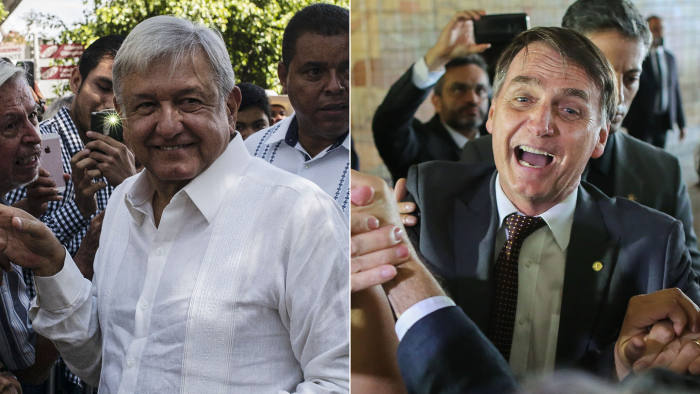The Financial Times, one of the most recognized and influential finance publications in the world states that Mexico’s new president will be unconstrained by institutions, unlike his Brazilian counterpart, and that makes him a bigger threat to liberal democracy.
On Saturday, Andrés Manuel López Obrador, a maverick leftist, will become president of Mexico and launch what he has called the country’s “fourth transformation”. How this progressive nationalist matches up against Donald Trump, his equally nationalistic neighbour, is anybody’s guess — although the US president is said to refer to him fondly in private as “Juan Trump”.
A month later, Jair Bolsonaro, a maverick conservative, will become president of Brazil and begin what he claims will be a radical reforging of society and the economy. With his crudely misogynistic and racist comments, divisive nationalism and praise of the dictatorship, the former army captain is often labelled a “Tropical Trump”. The two leaders are part of the epochal changes that are sweeping Latin America’s two biggest economies.
Although from opposite ends of the political spectrum, both are also throwbacks to an age of caudillos, or populist strong men, that the region had seemingly left behind. Who though is the bigger threat to liberal democracy? Almost certainly “peace and love” Mr López Obrador rather than “lock ‘em up” Mr Bolsonaro. That may sound provocative but it is only empirical.
Mr López Obrador will enjoy almost unconstrained power when he takes office. His party has majorities in the Senate and the Chamber. He has vast popular support, dominates his cabinet, inherits a relatively healthy macroeconomy thereby freeing him from immediate market pressures, and faces a feeble judiciary.
Furthermore, he wants even more power. He plans to create federal “super delegates”, answerable to the executive, to monitor all state programmes and their budgets. At the same time, public sector wage cuts have prompted an exodus of technocrats from the civil service, weakening Mexico’s few independent institutions that could check his power.
CLICK HERE FOR FULL ARTICLE ON FINANCIAL TIMES

